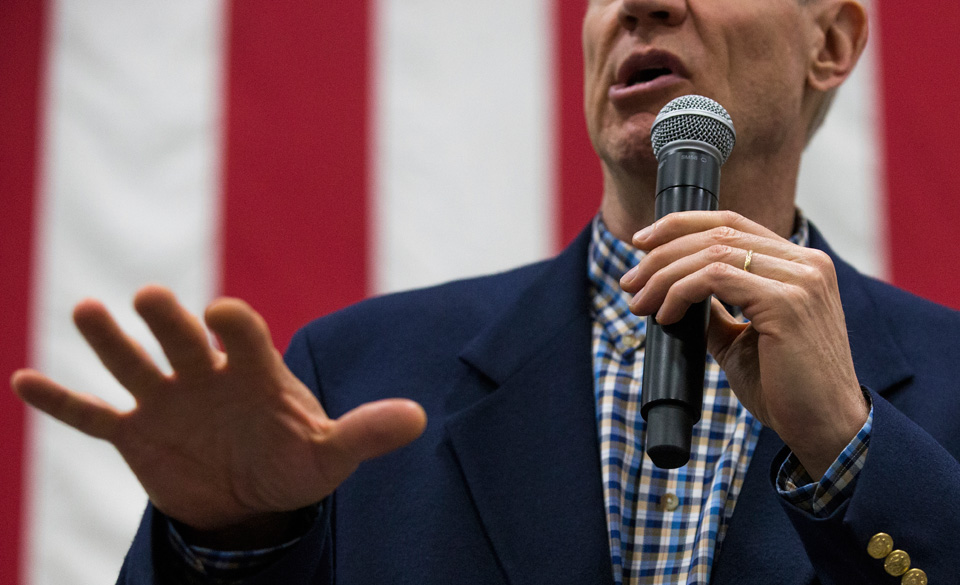
Recently, President Donald Trump appointed his son-in-law Jared Kushner to direct an overhaul of the federal government, making it more like a business. In response, Kushner said, “The government should be run like a great American company.”
Running the government like a business seems to be the dream of many CEOs and billionaires in public office. Similarly, many voters seem to believe business leaders will be more capable leaders because of their supposed abilities to “get things done.” Let’s take a look at what that means from a standpoint of democratic practices both in government and the workplace.
Let’s start with Illinois Republican Governor Bruce Rauner, whose campaign was funded with out-of-state billionaire money, as the New York Times reported.
For two years, Rauner has sabotaged the state legislature’s bi-partisan efforts to pass a compromise budget. Earlier this month, lllinois State Senator Kwame Raoul protested, “The people elected a governor, not a king.”
Raoul’s got a point, but he’s just a little off; it would be more illuminating to recognize Rauner’s leadership style as that of a CEO.
How have Rauner’s supposed business skills served the people of Illinois so far?
Without a state budget for two years, the state is in a virtual state of collapse as crucial state agencies and programs, including the state university system, have gone largely unfunded. And Rauner has refused to sign off on a budget without accompanying legislation that would curtail collective bargaining rights for unions, freeze property taxes permanently, renege on pension promises for state workers, and reduce the worker compensation liability for businesses.
This undemocratic, indeed authoritarian, “governing” style of business leader Rauner undermines democracy and the deliberative processes of our political system. It’s totally aimed at cutting off any debate.
In Washington, Trump has been up to the same thing. But his failure to pass his signature healthcare legislation reveals that the same business leader mentality that has hobbled Rauner’s agenda also plagues the president. Both betray an ignorance of and total lack of respect for representative democracy.
Rauner and Trump, like any CEO looking down the chain of command, expect legislators to bend to their wills. As business leaders, they were used to dictating and getting their way.
As we saw Trump celebrate in his role on The Apprentice, if he doesn’t like someone’s performance or behavior, he simply tells that person, “You’re fired!” That’s not how it works in our democracy, though. Neither Trump nor Rauner seem to appreciate the role of the people’s will in American society.
Our representatives are not hired by the president or the governor; they are elected by the people to look after our interests – not to simply enact the big boss president’s will. They are put in office precisely to provide a check and balance on executive power. Indeed, these elected representatives have the power to fire, or at least impeach, the president.
If we look outside the narrow political sphere, the CEO leadership styles of Trump and Rauner provide a reminder of the lack of democracy we all experience everyday in the workplace and in society more generally.
Indeed, as Michael Zweig has argued in his book, The Working Class Majority: America’s Best Kept Secret:
“On the job, most workers have little control over the pace and content of their work. They show up, a supervisor tells them the job, and they do it. The job may be skilled or unskilled, white collar or blue collar, in any one of thousands of occupations. Whatever the particulars, most jobs share a basic powerlessness in relation to the authority of the owner and owner’s representatives who are there to supervise and control the workforce.”
Indeed, most of us have little say in how our work is organized, what gets produced in our factories, how resources are used and distributed. In short, we are not involved in making most of the key decisions about how our world is run.
The governing behaviors of businessmen-turned-politicians like Trump and Rauner, who are leaving misery in their wakes and destroying democracy, are perfect examples of the lack of democracy we experience each day while spending all our time and energy reproducing the world in which we live.












Comments